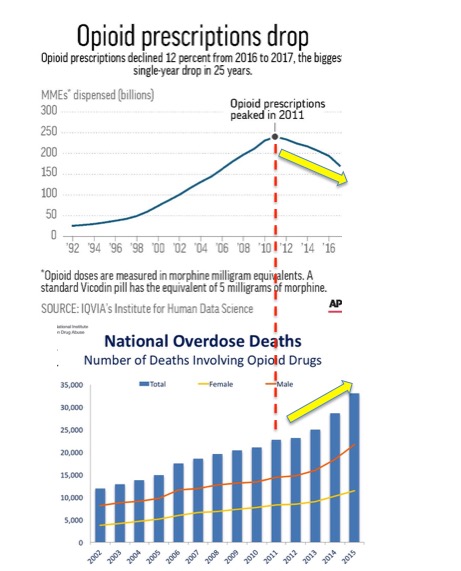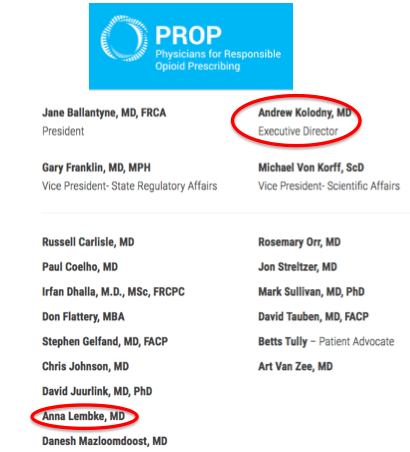Self-righteous busybodies, apparently not content with the carnage caused by their magnificently inept mishandling of the fake opioid crisis, (1) have taken up a new cause - one that will make many of you anxious. They are now concerned about an increase in the number of prescriptions written for another class of drugs - benzodiazepines, such as Xanax and Valium, which are used to treat anxiety. When the busybodies become concerned it's time for patients to be concerned because those who are speaking out are usually agenda-driven, unqualified, or both.
You could see this one coming years ago. Although opiates were, of course, the main focus of the intifada against controlled drugs, there were also whisperings by clueless academics and assorted other Percocet Puritans with too much time on their hands. "Oh, my! There are so many drugs out there that are being abused or might be. And we all know how well prohibition of drugs and alcohol works, right? So, let's get busy."
Can there possibly be a better (or more ironic) way to make anxious people even more so than to talk about restricting benzodiazepine anxiety medications? Let's express this mathematically:
- Life = Stress
- Stress + People = An Unknown Number of Anxious People
- An Unknown Number of Anxious People + Xanax* = Fewer Anxious People
- Fewer Anxious People + A Bunch of Idiots Threatening to Restrict Meds = More Anxious People
- More Anxious People + Idiots = More People Needing Meds
- More People Needing Meds + Fewer Meds = Suffering + Alcoholism + Street Drugs + Unintended Consequences
* Benzodiazepines, such as Valium and Xanax, should not be dispensed like candy nor should they be demonized. They are safe when used appropriately. So safe, in fact, that it is just about impossible to kill yourself with Valium alone (See: Can Valium Kill You?).
Today's train-wreck-in-waiting comes to us courtesy of an article from The Pew Charitable Trusts entitled "These Pills Could Be Next U.S. Drug Epidemic, Public Health Officials Say," which features some really awful propaganda. Here is some of it:
“We have this whole infrastructure set up now to prevent overprescribing of opioids and address the need for addiction treatment...we need to start making benzos part of that.”
Dr. Anna Lembke, a researcher and addiction specialist, Stanford University
"No, we don't."
Dr. Josh Bloom, not an addiction specialist, American Council on Science and Health
And there's more:
"What we’re seeing is just like what happened with opioids in the 1990s." (Dr. Lembke)
No, it's nothing of the sort. To even compare the addiction potential of Xanax or Valium and OxyCodone is ignorant, disingenuous, and just plain nuts. And to imply that an increase, even a substantial one, in prescriptions of benzodiazepines, will have anything even remotely close to the impact of truly addictive drugs is jaw-dropping.
in case you're in the mood for zealous overstepping, there's this:
"Doctors need to be informed that the medications should be prescribed for no more than two to four weeks. They were always meant to be short term."
Dr. Christy Huff, co-director Benzodiazepine Information Coalition, Utah
Doctors need to be informed? Really? Tell me that this language doesn't sound vaguely familiar to the CDC government-speak in the now infamous "CDC Guideline for Prescribing Opioids for Chronic Pain."
Guidelines, my arse. Guidelines do not include forcibly tapering (or cutting out entirely) the dose of medication given to chronic pain patients. Nor do they involve sending threatening letters to physicians who have the gall to exceed the "guidelines," even for a single patient for a single month. Or the DEA busting down doors of the few pain management physicians who are brave enough to put their livelihood and freedom on the line to care for their patients. Sure, let's have Christy Huff informing doctors.

Informing doctors? Original Photo: "Of Russian origin: The GULAG" Russiapedia (Translation: Bad doctors!)
If this all sounds vaguely familiar it is no accident. Remember PROP (2), the geniuses who spoon-fed their "guidelines," to the CDC which then turned them into deeply flawed policies and shoved them down Americans' collective throats? It remains unknown why the "guidelines" were enacted, especially since the FDA trashed the flimsy evidence used to justify them. A letter from Dr. Janet Woodcock, the director of the FDA's Center for Drug Evaluation, to Andrew Kolodny, the head of PROP at that time makes this clear (3).
In the end, PROP and the CDC got their way. How'd that work out? Let's see...

Source: (Top) AP News (Bottom) National Institute on Drug Abuse
Not so well, really. Far more people are dying than in 2011, and this is no coincidence.
So that fact that we're seeing both of the photos below in the same 2018 article cannot be a huge surprise.

"There's clowns to the left of me, Jokers to the right, here I am, Stuck in the middle with you." Stealer's Wheel, 1973. Photo credits: Clarion Ledger.
Because...

...just like Jason Vorhees, They're ba-ack!
Haven't these meddlers done enough damage? Apparently not, since they now want to put their collective feet down on another class of drugs - one which is very much safer - despite the fact that they screwed up royally the first time around.
Or maybe we could leave physicians alone and let the good ones - the vast majority of them - do their jobs without incompetents and tyrants breathing down their necks. Enough.
NOTES:
(1) As I have written before, we are not having an "opioid crisis." We are having a fentanyl crisis, which, ironically was partially caused by the coining of the term "opioid crisis."
(2) PROP is an acronym for Physicians for Responsible Opioid Prescribing, a self-appointed group of experts that had undue (and unexplained) influence with the CDC when the agency was formulating its disastrous "Guideline" document in 2016.
(3) "FDA has evaluated concerns pertaining to the serious risks of misuse, abuse, hyperalgesia,41 addiction, overdose, and death associated with opioid use. The Agency acknowledges that the available data demonstrate an association-though not necessarily a causal relationship-between opioid dose and certain serious risks of opioid use. However, FDA also agrees that more data are needed regarding the relationship between opioid dose and adverse effects, and the relationship between opioid duration of use and adverse effects, before the Agency can determine whether additional action needs to be taken. More data are also needed on the point at which the risks of opioid use at escalating doses and longer durations of treatment may outweigh the benefits of opioid analgesic therapy."
Janet Woodcock, M.D., September 10, 2013




